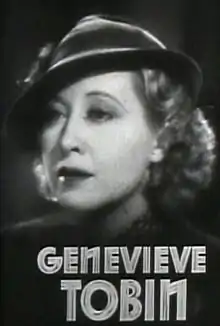Genevieve Tobin
Genevieve Tobin (November 29, 1899 – July 31, 1995) was an American actress.
Genevieve Tobin | |
|---|---|
 Tobin in the trailer for The Petrified Forest, 1936 | |
| Born | November 29, 1899 New York City, U.S. |
| Died | July 31, 1995 (aged 95) Pasadena, California, U.S. |
| Occupation | Actress |
| Years active | 1910–1940 |
| Spouse(s) | William Keighley (1938–1984; his death) |
Early years
Tobin was born in New York City[1] on November 29, 1899. Her father, Thomas Tobin, a bank clerk who later became a racetrack bookmaker, was born in Nova Scotia, Canada and her mother, Genevieve, was born in Washington, D.C. She had a sister, Vivian, and a brother, George.
Career
Tobin made her film debut in 1910 in Uncle Tom's Cabin as Eva. Her stage debut came in 1912 in Disraeli.[1] She appeared in a few films as a child and formed a double act with her sister Vivian. Their brother, George, also had a brief acting career. Following her education in Paris and New York, Tobin concentrated on a stage career in New York.
Although she was seen most often in comedies, she also played the role of Cordelia in a Broadway production of King Lear in 1923. Popular with audiences, she was often praised by critics for her appearance and style rather than for her talent, but in 1929, she achieved a significant success in the play Fifty Million Frenchmen. She introduced and popularized the Cole Porter song "You Do Something to Me", and the success of the role led her back to Hollywood, where she performed regularly in comedy films from the early 1930s.
She played prominent supporting roles opposite such performers as Jeanette MacDonald, Nelson Eddy, Cary Grant, Barbara Stanwyck, Claudette Colbert, Joan Blondell, and Kay Francis, but occasionally played starring roles, in films such as Golden Harvest (1933) and Easy to Love (1934). She played secretary Della Street to Warren William's Perry Mason in The Case of the Lucky Legs (1935). One of her most successful performances was as a bored housewife in the drama The Petrified Forest (1936), starring Leslie Howard, Bette Davis, and Humphrey Bogart.
She married director William Keighley[1] in 1938 and made only a few more films; her final film before retirement was No Time for Comedy (1940), with James Stewart and Rosalind Russell.
She remained married to Keighley until his death in 1984.[2]
Partial filmography
- Uncle Tom's Cabin (1910, Short) - Eva
- The Country Cousin (1919) - Eleanor Howitt
- No Mother to Guide Her (1923) - Mary Boyd
- Free Love (1930) - Mary
- A Lady Surrenders (1930) - Hope Ferrier
- Fires of Youth (1931) - Mildred
- Seed (1931) - Myra Deane
- The Gay Diplomat (1931) - Countess Diana Dorchy
- One Hour with You (1932) - Mitzi Olivier
- The Cohens and Kellys in Hollywood (1932) - Himself
- Hollywood Speaks (1932) - Gertie Smith / Greta Swan
- Perfect Understanding (1933) - Kitty Drayton
- Pleasure Cruise (1933) - Shirley Poole
- Infernal Machine (1933) - Elinor Green
- The Wrecker (1933) - Mary Regan
- Goodbye Again (1933) - Julie Wilson
- Golden Harvest (1933) - Cynthia Flint
- I Loved a Woman (1933) - Martha Lane
- Easy to Love (1934) - Carol
- Dark Hazard (1934) - Marge Mayhew Turner
- The Ninth Guest (1934) - Jean Trent
- Success at Any Price (1934) - Agnes
- Uncertain Lady (1934) - Doris Crane
- Kiss and Make-Up (1934) - Eve Caron
- By Your Leave (1934) - Ellen Smith
- The Woman in Red (1935) - Mrs. 'Nicko' Nicholas
- Here's to Romance (1935) - Kathleen Gerard
- The Goose and the Gander (1935) - Betty
- The Case of the Lucky Legs (1935) - Della Street
- Broadway Hostess (1935) - Iris
- The Petrified Forest (1936) - Mrs. Chisholm
- Snowed Under (1936) - Alice Merritt
- The Man in the Mirror (1936) - Helen
- The Great Gambini (1937) - Nancy Randall
- The Call of the Ring (1937) - Pauline Corbin
- Kate Plus Ten (1938) - Kate Westhanger
- Dramatic School (1938) - Gina Bertier
- Zaza (1939) - Florianne
- Yes, My Darling Daughter (1939) - Connie Nevins
- Our Neighbors - The Carters (1939) - Gloria Hastings
- No Time for Comedy (1940) - Amanda Swift (final film role)
References
- Fisher, James; Londré, Felicia Hardison (2017). Historical Dictionary of American Theater: Modernism. Rowman & Littlefield. p. 664. ISBN 9781538107867. Retrieved 7 September 2018.
- "The morals of Mitzi". The Guardian. England, London. September 19, 1995. p. 18. Retrieved September 6, 2018 – via Newspapers.com.

- Chaneles, Sol; Albert Wolsky (1974). The Movie Makers Octopus Books, p 97. ISBN 0-7064-0387-8
- The New York Times - Movies, accessed June 8, 2007
External links
| Wikimedia Commons has media related to Genevieve Tobin. |